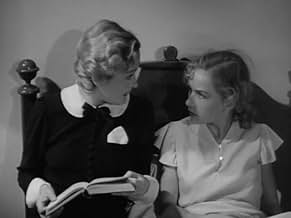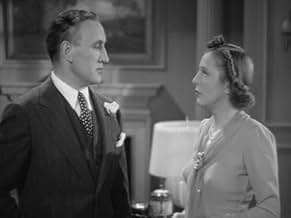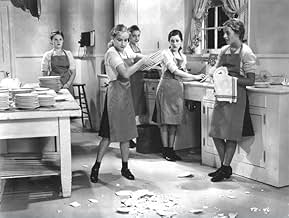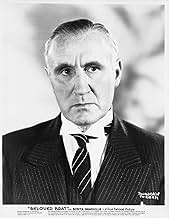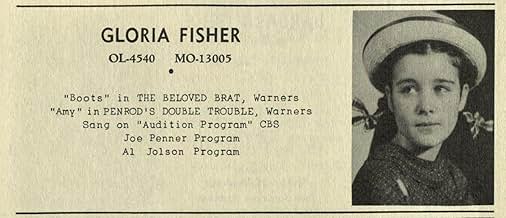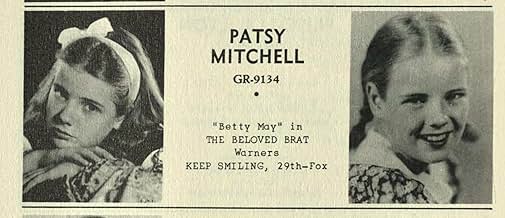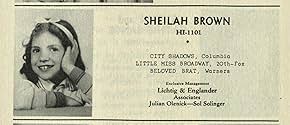The Beloved Brat
- 1938
- Tous publics
- 1h 2min
NOTE IMDb
6,1/10
252
MA NOTE
Ajouter une intrigue dans votre langueDrama about a problem child and her problem parents.Drama about a problem child and her problem parents.Drama about a problem child and her problem parents.
- Réalisation
- Scénario
- Casting principal
Lucile Gleason
- Miss Brewster
- (as Lucille Gleason)
Matthew 'Stymie' Beard
- Pinkie White
- (as Stymie Beard)
Gloria Fisher
- Boots
- (as Gloria Fischer)
Jessie Arnold
- Nurse
- (non crédité)
Mary Avery
- Teacher
- (non crédité)
Avis à la une
Roberta Morgan (Bonita Granville) has wealthy parents who don't care much about her. She is forced to give up a puppy for embarrassing her mother. She acts out against the household help. She befriends black siblings, Pinkie White and his sister Arabella. She is impressed with their loving family. She acts out more when Jenkins the butler kicks out her guest Pinkie.
I don't know the old time definition of brat. She's not really bratty in the modern sense for the first half hour. She's more a poor little rich girl. Of course, the fire is very bratty and the perjury is unforgiveable. In the end, Roberta is a conflicted character. The turns are abrupt. I would have preferred a simply runaway story and Pinkie can help her return home. The story leaves me a little unsatisfied. Leo Gorcey does have a good scene looking like his Dead End Kid. Granville is a fine young sassy actress. So I like the first half but the second half is not as compelling.
I don't know the old time definition of brat. She's not really bratty in the modern sense for the first half hour. She's more a poor little rich girl. Of course, the fire is very bratty and the perjury is unforgiveable. In the end, Roberta is a conflicted character. The turns are abrupt. I would have preferred a simply runaway story and Pinkie can help her return home. The story leaves me a little unsatisfied. Leo Gorcey does have a good scene looking like his Dead End Kid. Granville is a fine young sassy actress. So I like the first half but the second half is not as compelling.
A parental neglect social statement that comes dangerously close to the unintentional hilarity of "Reefer Madness". Fortunately it is saved by an extremely strong performance by Bonita Granville in the lead role (Roberta Morgan). While a bit of a reprise of her "These Three" nastiness, Granville's "The Beloved Brat" (1938) title role has considerably more dimensionality and the young actress displays unexpected range.
Granville was generally more cute than sexy, but this film has a pre-code feel to it and emphasizes her sensual side in several scenes. Donald Briggs of the pencil thin mustache plays her father's male secretary and they have a couple curious scenes together. These are certainly more interesting than his mildly romantic scenes with Dolores Costello who plays school principal Helen Morgan.
While the film might be of some interest to those focused on "Blacks in Hollywood", this is an extremely minor element within the film, artificially inserted just to lamely expand the "becoming a better person" theme.
Despite mostly weak supporting performances, Granville manages to sell her character and keeps a very unoriginal story quite involving. Fortunately she is in almost every scene. A must see for her fans.
Then again, what do I know? I'm only an inner child.
Granville was generally more cute than sexy, but this film has a pre-code feel to it and emphasizes her sensual side in several scenes. Donald Briggs of the pencil thin mustache plays her father's male secretary and they have a couple curious scenes together. These are certainly more interesting than his mildly romantic scenes with Dolores Costello who plays school principal Helen Morgan.
While the film might be of some interest to those focused on "Blacks in Hollywood", this is an extremely minor element within the film, artificially inserted just to lamely expand the "becoming a better person" theme.
Despite mostly weak supporting performances, Granville manages to sell her character and keeps a very unoriginal story quite involving. Fortunately she is in almost every scene. A must see for her fans.
Then again, what do I know? I'm only an inner child.
Bonita Granville, prior too 1938 plied her trade primarily at RKO with stints at other studios, like Paramount. For the most part her roles were of a obnoxious BRAT and not a very sympathetic character. Sometimes mildly irritating, like in CALVACADE (1933) FOX, often a real pain in the ass as in THESE THREE (1936) RKO or MAID OF SALEM (1937) PARAMOUNT. In late 1937 she was contracted by Warner Brothers (WB) and her career took a decisive turn.
THE BELOVED BRAT (1938) WB, clearly showed this change of pace. Bonita played a young Girl who is ignored by her business obsessed Father and a Mother more interested in 'bridge clubs' and local social exercises then her parental obligations. The first is somewhat excusable, the latter not at all. Though fifth-teen (15) at the time Bonita plays her character younger then her years, but gets it across very well. Her tribulations take her from confused and defiant adolescent to responsible young person. Ending with love and understanding for all.
Ms. Granville is supported by a competent script and cast. It was refreshing to see Black-Americans portrayed as Friends and not simple minded lackey's. At the WB and other studios they were often portrayed in a stereotypical way, particularly in the films of Bette Davis. She also has the advantage of Donald Crisp (was he ever young?) as her Father. I have never seen Mr. Crisp phone in a role, he is a professional every time. Silent Star, Doleros Costello, the former Mrs. John Barrymore (Drew's Grand-Mother) also delivers the goods. Still a delicate beauty and showing a effortless acting style.
Ms. Granville would work at the WB till the early 1940s' then moving on to MGM with occasional loan-outs. In all of her films she would bring her competent abilities and mature into a attractive actress. She knew when the 'gig' was up, married well (multi-million$ & oil) and became a Producer of LASSIE (T.V.)! This Women really had her head screwed on straight, dieing rather young at Sixty-Five (65).
THE BELOVED BRAT (1938) WB, clearly showed this change of pace. Bonita played a young Girl who is ignored by her business obsessed Father and a Mother more interested in 'bridge clubs' and local social exercises then her parental obligations. The first is somewhat excusable, the latter not at all. Though fifth-teen (15) at the time Bonita plays her character younger then her years, but gets it across very well. Her tribulations take her from confused and defiant adolescent to responsible young person. Ending with love and understanding for all.
Ms. Granville is supported by a competent script and cast. It was refreshing to see Black-Americans portrayed as Friends and not simple minded lackey's. At the WB and other studios they were often portrayed in a stereotypical way, particularly in the films of Bette Davis. She also has the advantage of Donald Crisp (was he ever young?) as her Father. I have never seen Mr. Crisp phone in a role, he is a professional every time. Silent Star, Doleros Costello, the former Mrs. John Barrymore (Drew's Grand-Mother) also delivers the goods. Still a delicate beauty and showing a effortless acting style.
Ms. Granville would work at the WB till the early 1940s' then moving on to MGM with occasional loan-outs. In all of her films she would bring her competent abilities and mature into a attractive actress. She knew when the 'gig' was up, married well (multi-million$ & oil) and became a Producer of LASSIE (T.V.)! This Women really had her head screwed on straight, dieing rather young at Sixty-Five (65).
This film is unexpectedly relevant to what is happening today, 70 years later, as the Western world is being flooded with spoilt 'Frankenkinder' and China is being flooded with even more spoilt 'little emperors'. This is a very gritty tale written by the Romanian refugee Jean Negulesco, before he had begun to direct films. Negulesco did not write the script, and I suspect that was softened, and the ending made more sentimental than in his original story, in order to be more 'audience friendly'. Bonita Granville, a highly talented young actress of the time (best known for her four Nancy Drew mystery films, in which she excelled when she was somewhat older), plays the neglected daughter of a truly appalling spoilt rich couple. The mother is the worst sort, many of whom I have had the misfortune to know and who are more common than ever today; her interest is herself, and a child is at best an accessory and at worst a nuisance to be disposed of to servants and then to a boarding school. In her case, however, she did not even have the excuse of being a 'killer career woman', but was merely an idle and vain social snob. The father is only interested in making money, and is always out doing so. This leaves the normally charming Bonita, who has a great deal of fire to her character, to rebel and become in protest a hideously spoilt brat, and eventually even a delinquent entangled in a crime. This process is clearly shown, to a degree not at all normal in Hollywood films, where false sentimentality was the usual way to view children. Bonita Granville rises to the challenge extremely well, not hesitating to make herself as odious as necessary. There is a very wicked butler who torments the girl secretly, there is a very nice male secretary who tries to help her, and eventually an angelic school headmistress who wishes to save her. The film is really a very savage attack on the idle rich and their family victims. Negulesco, who had been a 'companion to rich older women' at Nice before coming to Hollywood, was clearly describing a woman of precisely the type he had known personally, with a rich absent husband and a victimized daughter such as he must have observed at first hand. It is a bitter tale, and honestly done except for the ending.
Warner Bros. was known for gritty gangster pictures. Here, of all things, they've fashioned a gritty adolescent girl film, with a lot more boldness than I ever expected. More than a brat, Roberta's a little hellion, flinging food trays and emotional tizzies at the slightest provocation. We understand her problems come from an unloving wealthy household where she and the butler (Vogan) go ten-rounds without a referee.
But consider the darker side. She is, after all, partially responsible for the death of an innocent motorist, when she grabs the car wheel from butler Jenkins. The probation school reckoning for that strikes me as pretty mild. Nor, rather surprisingly, does the screenplay supply a moral reckoning. Also unexpected is the casualness with which Roberta crosses the colorline with Pinkie (Beard) and his Negro family. But then, she probably identifies more with them than with her distant mother and father. And I agree with another reviewer that there seems some innuendo from the handsome Williams toward the budding young woman.
All of this strikes me as unusual for a Production Code programmer. But then writer Negulesco directed some of the better studio products of the 40's and 50's, including the soulful Deep Valley (1947) and the surprisingly sensitive Take Care of My Little Girl (1952). Then too, Granville turns in an absolutely bravura performance that rivets attention throughout. Quite a risk for a young actress to make herself so unlikable for so much of the movie. Anyhow, the last third lapses into something much more conventional, as might be expected for what remains a commercial product. Nonetheless, there's enough of the unconventional in both filming and writing to make this little obscurity worth catching up with.
But consider the darker side. She is, after all, partially responsible for the death of an innocent motorist, when she grabs the car wheel from butler Jenkins. The probation school reckoning for that strikes me as pretty mild. Nor, rather surprisingly, does the screenplay supply a moral reckoning. Also unexpected is the casualness with which Roberta crosses the colorline with Pinkie (Beard) and his Negro family. But then, she probably identifies more with them than with her distant mother and father. And I agree with another reviewer that there seems some innuendo from the handsome Williams toward the budding young woman.
All of this strikes me as unusual for a Production Code programmer. But then writer Negulesco directed some of the better studio products of the 40's and 50's, including the soulful Deep Valley (1947) and the surprisingly sensitive Take Care of My Little Girl (1952). Then too, Granville turns in an absolutely bravura performance that rivets attention throughout. Quite a risk for a young actress to make herself so unlikable for so much of the movie. Anyhow, the last third lapses into something much more conventional, as might be expected for what remains a commercial product. Nonetheless, there's enough of the unconventional in both filming and writing to make this little obscurity worth catching up with.
Le saviez-vous
- AnecdotesThe $50 Roberta receives from her father as a birthday present would equate to over $900 in 2019.
- GaffesIn two consecutive scenes between Donald Briggs and Dolores Costello, one interior and then exterior, first the shadow of the mike and then the mike and boom can be seen.
- ConnexionsFeatured in Jack Wrather: A Legacy of Film and Friendship (2022)
Meilleurs choix
Connectez-vous pour évaluer et suivre la liste de favoris afin de recevoir des recommandations personnalisées
Détails
- Date de sortie
- Pays d’origine
- Langues
- Aussi connu sous le nom de
- L'enfant rebelle
- Lieux de tournage
- Sociétés de production
- Voir plus de crédits d'entreprise sur IMDbPro
- Durée1 heure 2 minutes
- Couleur
- Mixage
- Rapport de forme
- 1.37 : 1
Contribuer à cette page
Suggérer une modification ou ajouter du contenu manquant

Lacune principale
By what name was The Beloved Brat (1938) officially released in Canada in English?
Répondre
